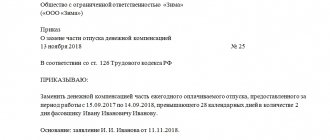0
152
4 min.
Unscheduled dismissal is the reason for accruing monetary compensation to an employee. The Labor Code regulates the grounds for payments upon cancellation of an agreement. The subsidy is issued separately from regular monthly income and other incentives. Material support allows you to find an alternative job without financial loss.
Procedure for payment of compensation
Article 178 part 1 of the Labor Code of the Russian Federation was recognized as inconsistent with the Constitution. The regulatory document does not establish uniform conditions for receiving benefits. The amount of compensation is determined depending on the reason for termination of cooperation, the average profit of an individual, the number of days worked per month, and the territorial affiliation of the legal address of the enterprise.
Payment terms, amount
Article 178 of the Labor Code of the Russian Federation defines the periods when the director is obliged to accrue compensation in case of unscheduled dismissal. The minimum period is 60 days. When liquidating a company or reducing staff, the employer must transfer funds in the amount of average income for the current period. Financial assistance is provided for no more than 2 months. The period is increased to a quarter if, after termination of the contract, the citizen registered with the employment center, where he was not provided with a vacancy within 2 weeks. For residents of the Far North, payments are allowed for six months, subject to registration at the labor exchange.
The amount of the benefit is determined by the basis for dismissal reflected in the order. If the company's activities are terminated, the number of employees is reduced, or the rules for concluding a contract are violated due to the fault of the manager, an average profit is paid. Exceptions are seasonal workers and citizens working under a fixed-term agreement.
It is important to know! Persons operating during a specified period of the year receive compensation for 2 weeks. For employees who have signed an agreement for a period of no more than 2 months, benefits are accrued according to the rules of the local regulatory document. If the drawn up act does not indicate the conditions for issuing a subsidy, payment is not made.
According to Article 178 of the Labor Code, certain categories of citizens are entitled to compensation, the amount of which is the average profit for 2 weeks. Reasons for calculating the reduced amount:
- employee refusal to accept an alternative position;
- conscription;
- reinstatement of an employee after illegal dismissal;
- disagreement with a change of place of residence;
- inability to perform official duties as determined by a doctor;
- changing clauses of the agreement.
To calculate, the average income per day must be multiplied by the number of working days following the month after dismissal. When establishing the amount of compensation, the period of labor activity is taken into account. The length of time spent on annual leave or sick leave, as well as holidays and weekends are not taken into account when calculating. The tax is levied on benefits amounting to three times the average income of a citizen. Insurance premiums are not deducted from compensation.
Supporting documents
There is a procedure for providing a subsidy upon termination of the agreement. To receive financial assistance, you must have documents confirming the termination of cooperation:
- warning on behalf of the manager about the upcoming dismissal;
- the employee’s consent to cancel the contract if notified by the employer earlier than 2 months before termination of cooperation;
- dismissal order;
- note-calculation form T-61;
- primary cash document on financial transfer.
To receive funds after dismissal before the next employment, the employee must have supporting documents. Based on a written application and a copy of the work record book, the former employer is obliged to provide financial support. If after 3 months a citizen has not found a job, he has the right to demand compensation if he has a certificate of registration on the stock exchange within 2 weeks after the termination of cooperation.
Attention! Labor Code art. 178 with comments allows for an increase in the period of registration with the employment center in the event of deterioration of health, assignment of government duties.
Calculation notes for form T-61 can be found here.
Payment of severance pay to employees upon layoff (Article 178 of the Labor Code of the Russian Federation)
Below is Article 178 of the Labor Code of the Russian Federation in the new edition, which came into force on August 13, 2021. For a better analysis of the innovations introduced into this article by Federal Law No. 210-FZ, the numbers of parts of Article 178 of the Labor Code of the Russian Federation are indicated. Part 7 of Article 178 of the Labor Code of the Russian Federation does not apply to layoffs for employees, so it is not indicated.
Article 178. Severance pay. Payment of average monthly earnings for the period of employment or one-time compensation (as amended by Federal Law No. 210-FZ of July 13, 2020) (Part 1) Upon termination of an employment contract due to the liquidation of the organization (clause 1 of part one of Article 81 of this Code) or by reducing the number or staff of an organization's employees (clause 2 of part one of Article 81 of this Code), the dismissed employee is paid severance pay in the amount of average monthly earnings. (as amended by Federal Laws dated June 30, 2006 N 90-FZ, dated July 13, 2020 N 210-FZ) (Part 2) If the duration of the period of employment of an employee dismissed due to the liquidation of the organization (clause 1 of part one of Article 81 of this Code) or a reduction in the number or staff of the organization’s employees (clause 2 of part one of Article 81 of this Code) exceeds one month, the employer is obliged to pay him the average monthly salary for the second month from the date of dismissal or part of it in proportion to the period of employment falling on that month . (Part two as amended by Federal Law No. 210-FZ dated July 13, 2020) (Part 3) In exceptional cases, by decision of the employment service body, the employer is obliged to pay an employee dismissed due to the liquidation of the organization (clause 1 of part one of Article 81 of this Code) or a reduction in the number or staff of the organization’s employees (clause 2 of part one of Article 81 of this Code), the average monthly salary for the third month from the date of dismissal or part thereof in proportion to the period of employment falling on this month, provided that within fourteen working days from the date of dismissal, the employee contacted this body and was not employed within two months from the date of dismissal. (part three introduced by Federal Law No. 210-FZ dated July 13, 2020) (part 4) In the case provided for in part two of this article, a dismissed employee has the right to apply in writing to the employer for payment of average monthly earnings for the period of employment no later than fifteen working days after the end of the second month from the date of dismissal, and in the case provided for in part three of this article - after the decision is made by the employment service body, but no later than fifteen working days after the end of the third month from the date of dismissal. When a dismissed employee applies for these payments, the employer makes them no later than fifteen calendar days from the date of application. (Part four introduced by Federal Law No. 210-FZ dated July 13, 2020) (Part 5) The employer, in return for paying average monthly earnings for the period of employment (parts two and three of this article), has the right to pay the employee a one-time compensation in the amount of twice the average monthly earnings. If the employee has already been paid the average monthly salary for the second month from the date of dismissal, a lump sum compensation is paid to him with offset of the specified payment. (Part five introduced by Federal Law No. 210-FZ dated July 13, 2020) (Part 6) Upon liquidation of an organization, payment of average monthly earnings for the period of employment (parts two and three of this article) and (or) payment of a lump sum compensation (part five of this article ) in any case must be carried out before the completion of the liquidation of the organization in accordance with civil law. (part six introduced by Federal Law No. 210-FZ dated July 13, 2020) (part 8) An employment contract or collective agreement may provide for other cases of payment of severance pay, as well as establish increased amounts of severance pay and (or) one-time compensation provided for in part five of this article, except for cases provided for by this Code. (as amended by Federal Laws dated 04/02/2014 N 56-FZ, dated 07/13/2020 N 210-FZ)
So, part 1 of article 178 of the Labor Code of the Russian Federation
understandable.
Part 2 of Article 178 of the Labor Code of the Russian Federation
specified the payment of severance pay to the employee for the second month after the date of his reduction. This issue was previously clarified by the Supreme Court of the Russian Federation in the same way as it is now enshrined in Part 2 of Article 178 of the Labor Code of the Russian Federation.
Part 3 of Article 178 of the Labor Code of the Russian Federation
specified the payment of severance pay to an employee for the third month after the date of his reduction. This issue was also explained earlier by the Supreme Court of the Russian Federation exactly as it is now enshrined in Part 3 of Article 178 of the Labor Code of the Russian Federation. Both previously and from August 13, 2021, it is workers of retirement age who are less likely to receive severance pay for the third month after the date of reduction. The main “merit” for this belongs to the Constitutional Court of the Russian Federation and the Supreme Court of the Russian Federation. About this here
Part 4 of Article 178 of the Labor Code of the Russian Federation
in fact, it limited the period for laid-off employees to apply to the employer for payment of severance pay for the second and third months after the date of layoff to fifteen working days (precisely working days, not calendar days). In general, this is more to the advantage of employers if a laid-off employee misses these 15 working days.
Part 5 of Article 178 of the Labor Code of the Russian Federation
indeed has an innovation regarding the payment by employers of laid-off workers of a one-time compensation in the amount of twice the average monthly earnings.
Only this depends on the will of the employer, and not on the desire of the laid-off employee. That is, the employer has the right
to use the provisions of Part 5 of Article 178 of the Labor Code of the Russian Federation, but
is NOT OBLIGED.
Employers, as a rule, in such cases and in similar ones, primarily care about their rights and interests, and not about the rights and interests of employees.
Part 6 of Article 178 of the Labor Code of the Russian Federation
is really useful for laid-off workers during the liquidation of organizations, but not for those workers who work in organizations liquidated through bankruptcy on the basis of the provisions of
Federal Law No. 127-FZ of October 26, 2002 “On Insolvency (Bankruptcy)”
.
Reasons for reducing the benefit amount
The legislation does not define a single payment amount. Financial assistance is not available to part-time workers or citizens who have shown unsatisfactory test results when applying for a job. The benefit is not accrued when concluding a fixed-term employment contract. Compensation for this category of persons is established by internal regulations. The minimum payment is determined for persons who terminated a fixed-term contract after a violation of the law by the head of the enterprise. The weekly average income is issued to temporary and seasonal employees who have ceased to perform official duties due to a production nature or a reduction in the volume of work.
Payment of severance pay to employees upon layoff (Article 318 of the Labor Code of the Russian Federation)
Let's look at the innovations of Article 318 of the Labor Code of the Russian Federation, which has been in force in the new edition since August 13, 2021.
Article 318. State guarantees for an employee dismissed due to the liquidation of an organization or a reduction in the number or staff of the organization’s employees (as amended by Federal Law No. 210-FZ of July 13, 2020) (Part 1) For an employee dismissed from an organization located in the regions of the Extreme North and equivalent areas, in connection with the liquidation of an organization (clause 1 of part one of Article 81 of this Code) or reduction in the number or staff of the organization’s employees (clause 2 of part one of Article 81 of this Code), severance pay is paid in the amount of average monthly earnings. (Part 2) If the duration of the employment period of an employee dismissed due to the liquidation of an organization (clause 1 of part one of Article 81 of this Code) or a reduction in the number or staff of the organization’s employees (clause 2 of part one of Article 81 of this Code) exceeds one month, the employer is obliged to pay him the average monthly salary for the second month from the date of dismissal or part thereof in proportion to the period of employment falling on this month, and if the duration of the period of employment exceeds two months - for the third month from the date of dismissal or part thereof in proportion to the period of employment, falling for this month. (Part 3) In exceptional cases, by decision of the employment service body, the employer is obliged to pay an employee dismissed due to the liquidation of the organization (clause 1 of part one of Article 81 of this Code) or a reduction in the number or staff of the organization’s employees (clause 2 of part one of Article 81 of this Code) Code), average monthly earnings successively for the fourth, fifth and sixth months from the date of dismissal or part thereof in proportion to the period of employment falling on the corresponding month, provided that within fourteen working days from the date of dismissal the employee applied to this body and was not employed within three, four and five months, respectively, from the date of dismissal. (Part 4) In the case provided for in part two of this article, a dismissed employee has the right to apply in writing to the employer for payment of the average monthly salary for the period of employment no later than fifteen working days after the end of the second and third months, respectively, from the date of dismissal, and in the case provided for in part three of this article - after the decision is made by the employment service body, but no later than fifteen working days after the end of the fourth, fifth and sixth months, respectively, from the date of dismissal. When a dismissed employee applies for these payments, the employer makes them no later than fifteen calendar days from the date of application. (Part 5) The employer, in return for paying the average monthly salary for the period of employment (parts two and three of this article), has the right to pay the employee a one-time compensation in the amount of five times the average monthly salary. If the employee has already received payments of average monthly earnings for the second, third, fourth or fifth month from the date of dismissal, a lump sum compensation is paid to him with offset of these payments. (Part 6) When liquidating an organization, payments of average monthly earnings for the period of employment (parts two and three of this article) and (or) payment of a lump sum compensation (part five of this article) in any case must be made before the completion of the liquidation of the organization in accordance with civil law legislation. (Part 7) Payment of severance pay in the amount of average monthly earnings, as well as payments of average monthly earnings for the period of employment and (or) one-time compensation provided for in parts one - three and five of this article, are made by the employer at the previous place of work at the expense of this employer.
Article 318 of the Labor Code of the Russian Federation, as amended, valid until August 13, 2020, had 3 parts.
Since August 13, 2020, this article has become 7 parts.
Part 1 of Article 318 of the Labor Code of the Russian Federation
is also understandable.
Part 2 of Article 318 of the Labor Code of the Russian Federation
specified the payment of severance pay to the employee for the second month and for the third month after the date of his reduction. This issue was previously clarified by the Supreme Court of the Russian Federation in the same way as enshrined in Part 2 of Article 318 of the Labor Code of the Russian Federation, and did not raise questions from employers, much less from judges of lower courts.
Part 3 of Article 318 of the Labor Code of the Russian Federation
expanded and more specific regarding the payment by employers of severance pay to laid-off employees for the fourth, fifth and sixth months after the date of their layoff.
Also, workers of retirement age are less likely to receive severance pay for the fourth, fifth and sixth months after the date of reduction, which follows from the explanation of the Constitutional Court of the Russian Federation in the Determination of November 29, 2012 No. 2214-0
and the conclusions
of the Supreme Court of the Russian Federation in the Determination of March 27, 2017 No. 69-KG 16-18
. Read more about it here
Part 4 of Article 318 of the Labor Code of the Russian Federation
in fact, it also limited the period for laid-off employees to apply to the employer for payment of severance pay for the second, third, fourth, fifth, sixth month after the date of layoff to fifteen working days. A useful innovation in Part 4 of Article 318 of the Labor Code of the Russian Federation is the deadline for employers to pay severance pay when a dismissed employee applies no later than fifteen calendar days from the date the employee applies.
Part 5 of Article 318 of the Labor Code of the Russian Federation
is similar to Part 5 of Article 178 of the Labor Code of the Russian Federation, according to which the employer
has the right
to pay a one-time compensation to a laid-off employee in the amount of five times the average monthly earnings, but is
NOT OBLIGED
.
Many employers who have lawyers on staff are well aware of judicial practice, including the Ruling of the Constitutional Court of the Russian Federation dated November 29, 2012 No. 2214-0 and the Ruling of the Supreme Court of the Russian Federation dated March 27, 2017 No. 69-KG 16-18
, and therefore apply the provisions Part 5 of Article 318 of the Labor Code of the Russian Federation is unlikely to happen in practice, since this is not in their interests.
Part 6 of Article 318 of the Labor Code of the Russian Federation
similar to Part 6 of Article 178 of the Labor Code of the Russian Federation.
Upon voluntary dismissal
Severance pay upon dismissal of one's own free will is not a legal concept, since Article 178 of the Labor Code of the Russian Federation stipulates severance pay only for those employees who were dismissed by the employer. However, voluntary termination compensation often refers to all payments due to the former employee, such as final salary and vacation pay.
The Labor Code allows employers to establish special “compensation” for employees dismissed at their own request. In this case, provisions regarding this should be enshrined in the collective agreement or in an additional agreement to the collective agreement (often such an additional agreement is concluded precisely in connection with dismissal).










